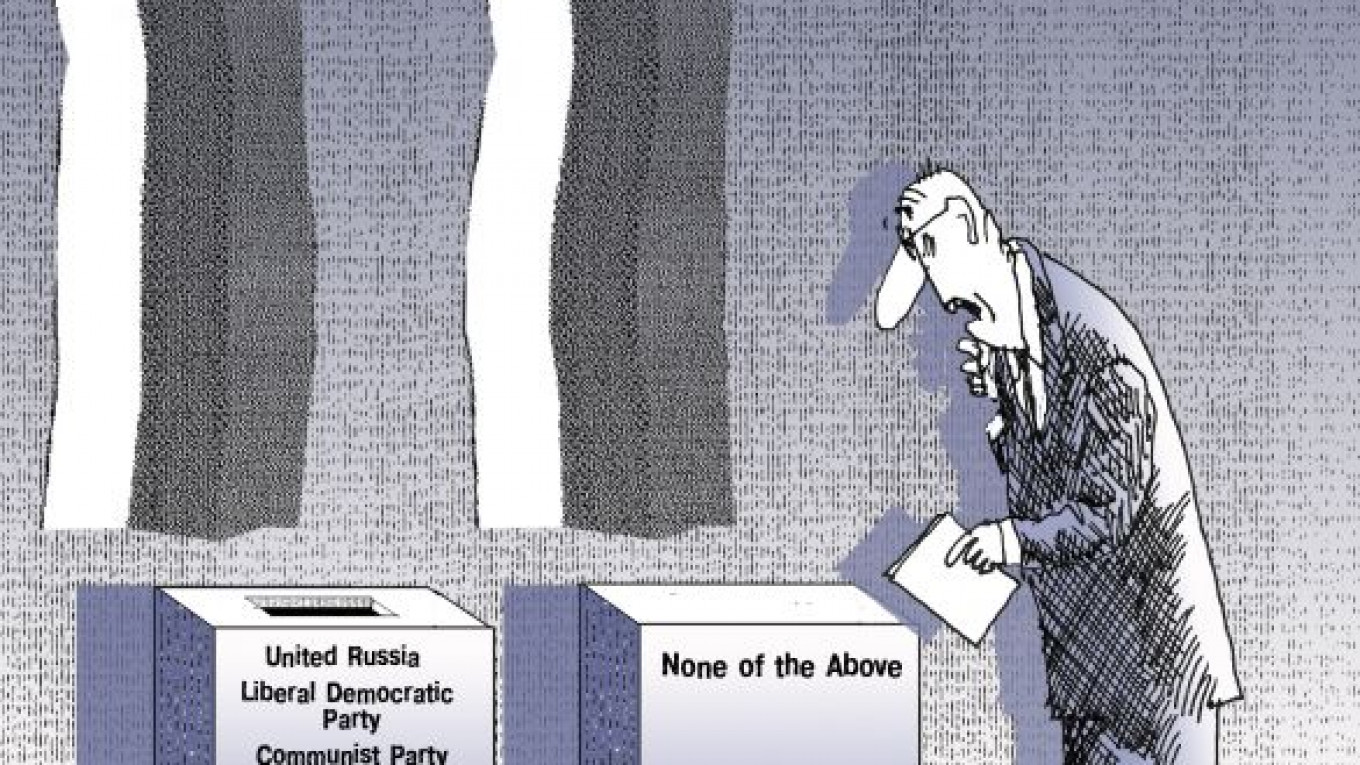Millions of Russians are again faced with a difficult decision — should they participate in or boycott the Dec. 4 State Duma elections?
Opinion polls show a growing protest mood among voters as well as falling ratings for the ruling tandem and United Russia. Against this backdrop, many people have chosen to simply not vote for anyone. After all, the true opposition parties — that is, those that have not colluded with the Kremlin, such as the Party of People’s Freedom or The Other Russia — have been barred from registering for these elections. Thus, their supporters are unable to vote for the party and candidates of their choice.
The Kremlin has established a political monopoly that goes beyond the domination of United Russia. Alongside the official “party of power” are a handful of Kremlin-sanctioned parties that are only imitation opposition parties. In economics, these kinds of monopolies are called cartels. In Russian politics, I would call it the Kremlin’s “seven-party cartel”
Members of the cartel can retain their registration, hold seats in parliament and participate in elections as long as they remain loyal to the leadership and do not challenge its monopoly on power. Otherwise, they will be eliminated without hesitation, stripped of their status and denied the right to participate in elections. The dissolution of the successful and increasingly independent Rodina party in 2006 was a case in point.
Russia is run by a political regime that has eliminated the constitutionally guaranteed right to political competition, freedom to participate in politics and freedom of speech. Today’s regime has managed to create a cynical imitation of a multiparty system and elections.
Under such conditions, voting for any of the Kremlin-approved parties only strengthens and helps legitimize the authoritarian regime and its sham democracy. Thus, for me and millions of other Russians, it is politically and morally unacceptable to take part in legitimizing a corrupt autocracy whose ruling political and business elites will do everything in their power to remain in control and protect their assets for decades.
A political system in which citizens and political forces are barred from participating in elections, in which the media is widely censored and the authorities dictate the behavior of the parties that are allowed to register cannot be called legitimate.
Protest is the only option for Russians who support democracy and do not want another 18-year (or longer) Brezhnev era of stagnation and degradation. One way to protest is if voters boycott the elections. But the disadvantage of this is that nonparticipation makes it easier for the authorities to stuff even more absentee ballots in the box. Another option is to go to the polls and to walk out with your ballot in hand. The difficulty is that the police often stop these voters before they exit the polling station.
But the most effective form of protest is to invalidate the ballot by, for example, drawing a huge “X” across the entire page. It is best to arrive in the evening, just 30 minutes before the polls close, to make sure that nobody has fraudulently signed and voted in your name already.
Invalidating ballots would effectively return the “none of the above” choice, which the authorities removed from ballots in 2006, fearing that more people would check off this option than United Russia candidates in federal and regional elections, as well as United Russia-supported candidates in presidential elections.
Ballot invalidation is the only option available to vote against United Russia and its loyal satellites. Ballot invalidators would essentially make up the core of a formidable “eighth political party” — none of the above. These ballots are not counted when allocating mandates, but they will cause the Kremlin’s satellite parties to receive a smaller percentage of the vote along with United Russia. What’s more, invalidated ballots become part of the final tally, and a significant total will indicate the extent of the public’s protest against the corrupt power vertical.
Documentation of widespread fraud coupled with the results of the protest vote will enable opposition forces to question the legitimacy of the elected Duma and call for new elections — this time with participation open to all and public control over the election process.
Many still believe that there are alternative candidates in the elections. Others, myself included, believe that the only option available, given the Kremlin’s political cartel, is to vote against everyone.
Every citizen must make his or her choice. The future of Russia will depend on it.
Vladimir Ryzhkov, a State Duma deputy from 1993 to 2007, hosts a political talk show on Ekho Moskvy radio and is co-founder of the opposition Party of People’s Freedom.
A Message from The Moscow Times:
Dear readers,
We are facing unprecedented challenges. Russia's Prosecutor General's Office has designated The Moscow Times as an "undesirable" organization, criminalizing our work and putting our staff at risk of prosecution. This follows our earlier unjust labeling as a "foreign agent."
These actions are direct attempts to silence independent journalism in Russia. The authorities claim our work "discredits the decisions of the Russian leadership." We see things differently: we strive to provide accurate, unbiased reporting on Russia.
We, the journalists of The Moscow Times, refuse to be silenced. But to continue our work, we need your help.
Your support, no matter how small, makes a world of difference. If you can, please support us monthly starting from just $2. It's quick to set up, and every contribution makes a significant impact.
By supporting The Moscow Times, you're defending open, independent journalism in the face of repression. Thank you for standing with us.
Remind me later.


